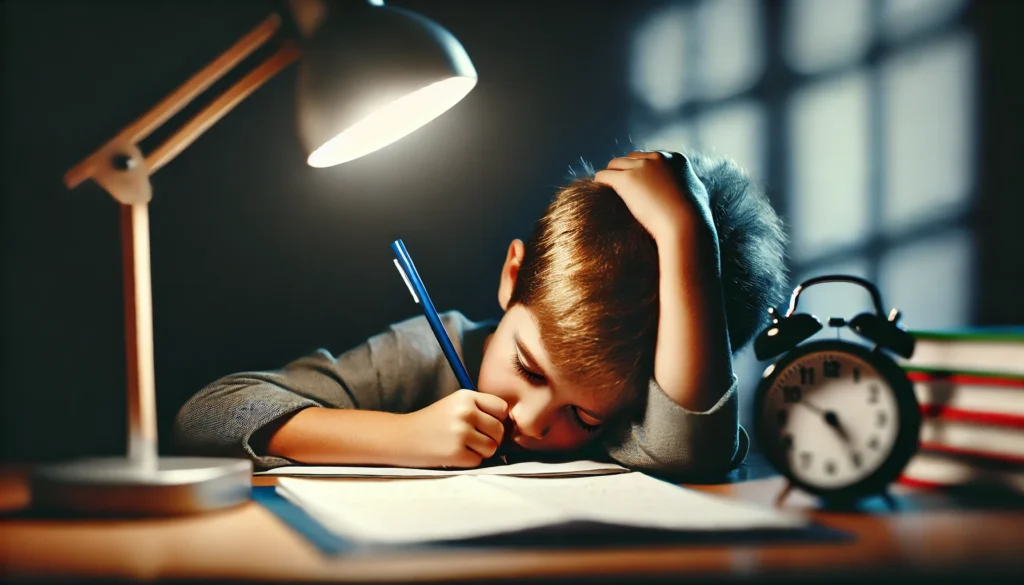Childhood sleep deprivation occurs when a child consistently does not get the recommended amount of sleep for their age group. According to the National Sleep Foundation, children aged 6–13 should get 9–11 hours of sleep per night, while teenagers need about 8–10 hours. However, studies reveal that a significant number of children are not meeting these guidelines, which sets the stage for various developmental challenges.
Recommended Sleep Duration by Age
The National Sleep Foundation provides age-specific sleep recommendations. For instance, preschoolers need about 10-13 hours of sleep, while toddlers require 11-14 hours. Understanding these needs helps in setting realistic sleep goals for children of different ages.
The Importance of Sleep for Development
Sleep plays a crucial role in children’s development, influencing everything from physical growth to emotional regulation. Quality sleep is essential for cognitive functions such as memory and problem-solving skills. Missing out on adequate rest can hinder a child’s ability to learn and retain information.
Recognizing Sleep Deprivation Early
Early recognition of sleep deprivation can prevent severe consequences. Parents and educators should be vigilant in observing signs of sleep deprivation, ensuring timely intervention to mitigate its adverse effects on a child’s health and performance.
You May Also Like: Understanding the Impact of Chronic Sleep Deficiencies
Symptoms of Sleep Deprivation in Children
Understanding the symptoms of sleep deprivation in children is essential for timely intervention. Common symptoms include:
Behavioral and Emotional Symptoms
Irritability and mood swings are often the first noticeable signs of sleep deprivation in children. A lack of sleep can lead to increased emotional instability, causing children to react more intensely to daily challenges. They may also experience heightened anxiety or feelings of sadness, impacting their social interactions and overall well-being.
Cognitive and Academic Challenges
Attention and concentration issues are prevalent among sleep-deprived children. This lack of focus can lead to difficulties in following instructions, completing tasks, and understanding new concepts. Consequently, poor academic performance may arise, as sleep is crucial for memory consolidation and learning processes.
Physical Manifestations
Physical symptoms of sleep deprivation include persistent fatigue, headaches, and a weakened immune system. Children may appear lethargic during the day, struggle with frequent illnesses, and show a general decline in physical activity. These symptoms can compound, leading to more severe health issues if not addressed promptly.

Causes of Sleep Deprivation in Children
Various factors contribute to sleep deprivation in children. Understanding these causes can help in addressing the issue effectively.
The Role of Technology and Screen Time
The prevalence of screens in children’s lives is a significant factor. The blue light emitted from devices can disrupt the production of melatonin, a hormone responsible for regulating sleep-wake cycles. Moreover, engaging with stimulating content before bed can make it difficult for children to unwind, delaying sleep onset.
Impact of Over-Scheduling and Academic Pressure
Modern children often have packed schedules, including extracurricular activities and homework. This over-scheduling can encroach on their sleep time, leading to chronic sleep deprivation. The pressure to excel academically adds to stress levels, further disrupting sleep patterns.
Sleep Disorders and Their Consequences
Conditions such as sleep apnea or restless leg syndrome can also be culprits. These disorders interrupt the sleep cycle, preventing restorative sleep. Identifying and addressing these disorders early can prevent long-term health consequences and improve overall sleep quality for affected children.
Environmental and Lifestyle Factors
Environmental factors, such as noise and room temperature, can significantly impact a child’s ability to sleep well. Lifestyle habits, including diet and exercise, also play a role in sleep quality. Understanding and optimizing these elements can help create a more conducive sleep environment for children.
The Historical Context of Sleep Deprivation
Historically, sleep patterns have evolved significantly. Pre-industrial societies often followed natural daylight cycles, which promoted healthier sleep habits. However, the advent of artificial lighting and digital technology has dramatically altered these patterns.
Evolution of Sleep Patterns
In pre-industrial times, people adhered closely to natural light cycles, leading to more consistent sleep patterns. The introduction of electricity extended waking hours, disrupting natural sleep rhythms and contributing to modern sleep challenges.
Technological Advancements and Sleep
The rise of artificial lighting and digital devices has profoundly impacted sleep behaviors. While technology offers numerous benefits, its influence on sleep cannot be overlooked. Understanding its effects can help in developing strategies to mitigate its impact on children’s sleep.
Cultural Shifts and Sleep Norms
Cultural perceptions of productivity and success have also influenced sleep norms. The glorification of busyness often leads to undervaluing sleep, affecting both adults and children. Recognizing the cultural factors at play can aid in reshaping attitudes towards sleep as a vital component of health.

Current Trends in Childhood Sleep
Recent studies highlight a worrying trend: an increasing number of children are experiencing sleep deprivation. The rise of digital media and increasing academic pressures are key contributors to this trend.
Statistical Insights into Sleep Deprivation
Data from recent surveys underscore the prevalence of sleep deprivation among children. Understanding these statistics helps to grasp the magnitude of the issue and the urgent need for intervention.
Academic and Social Pressures
The increasing demands of schoolwork and social activities contribute to reduced sleep duration in children. Balancing these demands with the need for adequate rest is essential for fostering healthy development.
The Role of Parents and Educators
Parents and educators play a crucial role in addressing sleep deprivation. By setting realistic expectations and promoting healthy sleep habits, they can help children navigate the challenges of modern life without sacrificing sleep.
Future Implications of Sleep Deprivation
The long-term effects of childhood sleep deprivation can be dire. Chronic sleep loss is linked to obesity, mental health issues, and cardiovascular diseases. Moreover, the cognitive deficits associated with sleep deprivation can have lifelong implications.
Health Risks Associated with Chronic Sleep Loss
Chronic sleep deprivation increases the risk of numerous health problems, including obesity, diabetes, and cardiovascular diseases. Addressing sleep issues early can help mitigate these risks and promote healthier lifestyles.
Cognitive and Emotional Consequences
The cognitive deficits resulting from sleep deprivation can hinder a child’s academic and personal development. Emotional consequences, such as increased anxiety and depression, can also arise, highlighting the importance of addressing sleep issues promptly.
Long-Term Societal Impact
The societal impact of widespread sleep deprivation is significant. Future generations facing chronic health problems and cognitive challenges can strain healthcare systems and affect overall societal productivity. Prioritizing sleep now can help alleviate these future burdens.

Practical Solutions and Recommendations
Addressing childhood sleep deprivation requires a multi-faceted approach. Here are some practical strategies:
Establishing a Consistent Sleep Routine
Creating and maintaining a regular sleep schedule is crucial. Encourage children to go to bed and wake up at the same time every day, even on weekends. Consistency helps regulate the body’s internal clock, making it easier for children to fall asleep and wake up naturally.
Limiting Screen Time and Promoting Alternatives
Reducing screen exposure, especially before bedtime, can significantly improve sleep quality. Encourage reading or other calming activities as part of the bedtime routine. Providing alternatives to screen time not only improves sleep but also fosters creativity and relaxation.
Creating a Sleep-Conducive Environment
Ensure the child’s bedroom is conducive to sleep. This means a cool, dark, and quiet environment. Consider using blackout curtains and white noise machines if necessary. Personalizing the sleep space to meet a child’s preferences can also enhance their comfort and readiness for sleep.
Addressing Stress and Anxiety
Teaching children stress-management techniques, such as mindfulness and deep-breathing exercises, can alleviate anxiety that disrupts sleep. Incorporating these practices into daily routines helps children develop resilience against stressors that affect sleep.
Seeking Professional Help When Necessary
If sleep issues persist, it may be beneficial to consult a pediatrician or sleep specialist. They can identify underlying sleep disorders and recommend appropriate treatments. Professional guidance ensures that any serious sleep-related issues are addressed effectively.
Conclusion
Childhood sleep deprivation is a pressing issue with far-reaching consequences. By understanding the symptoms, causes, and solutions, we can take proactive steps to ensure our children get the rest they need. Prioritizing sleep not only enhances their immediate well-being but also sets the foundation for a healthier future. As health and wellness coaches, science journalists, or biohackers, sharing this knowledge can empower others to make informed decisions about sleep health.
In an era where every minute counts, let us not forget the timeless value of a good night’s sleep for our children. By fostering an environment that prioritizes rest, we can contribute to the growth of healthier, happier, and more successful future generations.
Further Reading:
Among teens, sleep deprivation an epidemic
Study flags later risks for sleep-deprived kids
Lack of Sleep Increases a Child’s Risk for Emotional Disorders Later
Important Note: The information contained in this article is for general informational purposes only, and should not be construed as health or medical advice, nor is it intended to diagnose, prevent, treat, or cure any disease or health condition. Before embarking on any diet, fitness regimen, or program of nutritional supplementation, it is advisable to consult your healthcare professional in order to determine its safety and probable efficacy in terms of your individual state of health.
Regarding Nutritional Supplements Or Other Non-Prescription Health Products: If any nutritional supplements or other non-prescription health products are mentioned in the foregoing article, any claims or statements made about them have not been evaluated by the U.S. Food and Drug Administration, and such nutritional supplements or other health products are not intended to diagnose, treat, cure, or prevent any disease.


